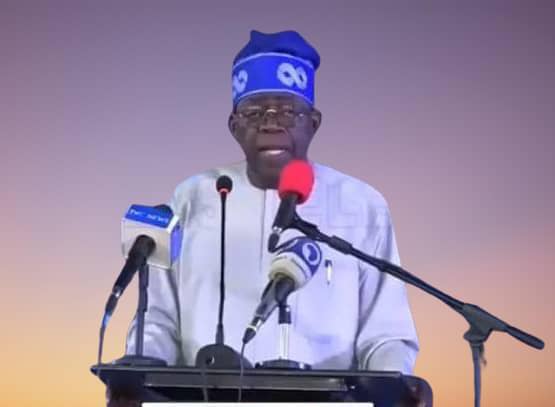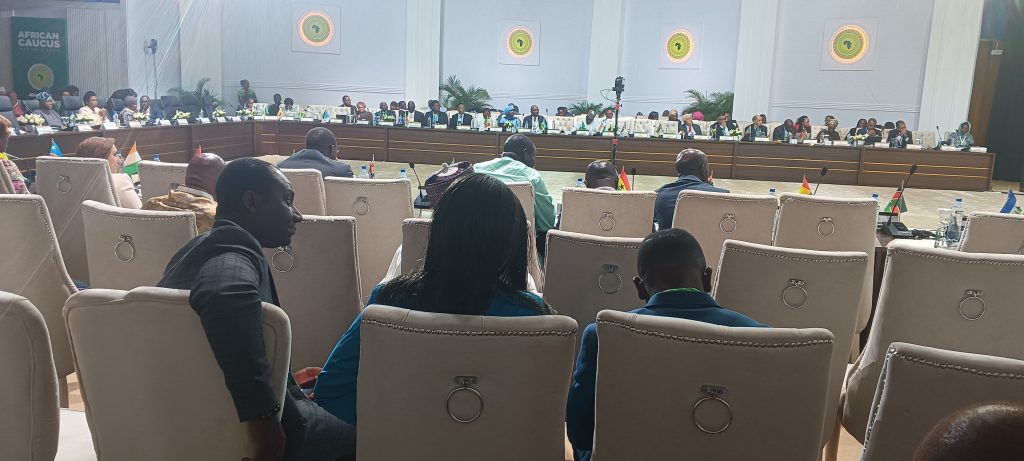
President Bola Ahmed Tinubu has announced that his administration is implementing bold economic policies to drive Nigeria’s economy out of the downturns caused by multiple global economic shocks.
Speaking at the 2024 African Caucus Meeting at the Transcorp Hotel, Abuja,

President Tinubu, represented by Vice President Kashim Shettima, emphasized the need for global cooperation among African countries to address shared economic challenges and capitalize on opportunities. Despite grappling with numerous challenges across economic, humanitarian, and social spheres, African countries must leverage their natural resources and human capital for growth, innovation, and collaboration.
The African Caucus Meeting, established in 1963 to strengthen the voice of African Governors in the Bretton Woods Institutions (BWIs), is chaired by Nigeria’s Minister of Finance and Coordinating Minister of the Economy, Mr. Wale Edun. This year’s theme, “Facilitating Intra-African Trade: Catalyst for Sustainable Economic Growth in Africa,” reflects the commitment of member countries to economic advancement.
President Tinubu’s address, titled “A Shared Vision for Africa’s Growth,” outlined Nigeria’s ongoing efforts to address global economic challenges. He urged African countries to enhance the quality of life by ensuring democracy, good governance, and effective economic institutions.
“We have initiated bold economic reforms to steer our economy away from the downturns caused by multiple global shocks. Our reforms focus on fiscal and monetary efficiency, driving sustained economic growth, and creating jobs, aligned with the SDGs’ priorities. Our efforts are yielding positive results, with improved macroeconomic stability and increased investment,” said President Tinubu.
The President called for enhanced international tax cooperation to combat illicit financial flows and ensure multinationals contribute fairly to African economies. “We need enhanced international tax cooperation to combat illicit financial flows and ensure that multinationals contribute fairly to our economies. We must also foster global economic cooperation to tackle shared challenges and leverage opportunities,” he said.
The African Caucus Meeting serves as a vital platform for sharing experiences, forging partnerships, and charting a collective path forward. President Tinubu highlighted Africa’s resilience, creativity, and hope, acknowledging significant strides in economic growth, social progress, and political stability. However, he expressed concern over increasing poverty, rising debt, inequality, and conflicts that hinder the continent’s progress toward the 2030 Agenda for Sustainable Development Goals.
In his welcome address, Chairperson of the Caucus, Mr. Wale Edun, noted that 41 African countries are set for stronger growth, projecting up to 3.8% growth in 2023 and rising to 4.3% in 2025, exceeding the global average of about 3.2%.
Governor of the Central Bank of Nigeria, Mr. Olayemi Cardoso, emphasized Africa’s need to navigate a complex landscape with unprecedented opportunities for development. He called for leveraging global partnerships to achieve sustainable economic growth.
African Union Commissioner for Economic Development, Trade, Tourism, Industry and Minerals, Ambassador Albert Muchanga, highlighted the importance of domestic resource mobilization. He urged viewing the African market as a viable channel for this purpose.
Director-General of the World Trade Organisation (WTO), Dr. Ngozi Okonjo-Iweala, provided a comprehensive analysis of Africa’s economic situation, emphasizing greater regional integration. She noted that only 13% of Africa’s goods trade was internal in 2021, compared to higher percentages in other regions.
Deputy Secretary-General of the United Nations, Amina J. Mohammed, stressed the importance of trade facilitation, a Pan-African payment and settlement system, and increased access to energy and connectivity. She addressed the challenges of public investment, highlighting that 48% of government revenue in sub-Saharan Africa went to debt payments in the previous year.
Prime Minister of Rwanda, Dr. Edouard Ngirente, emphasized the transformative potential of the AfCFTA and called for concrete actions to remove trade barriers and create an integrated African market. He assured that these efforts would boost trade, drive innovation, create jobs, and improve living standards across the continent.
Lord Paul Boateng, a member of the UK House of Lords and keynote speaker at the event, expressed concern over Africa’s regression in diversification and competitiveness over the past 20 years. He urged the adoption of technological advancements like block chain and artificial intelligence to transform trade on the continent.
